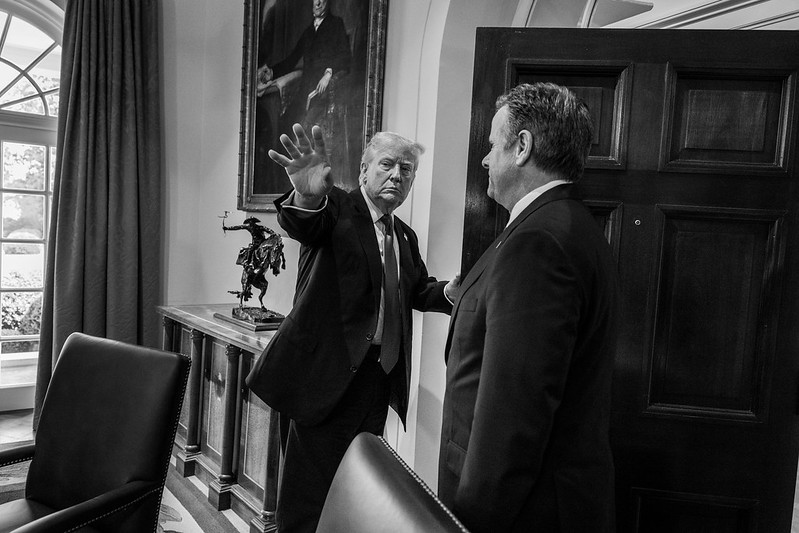Trump's "I Don't Know" Responses on Constitution, Due Process Fuel Rule of Law Concerns

In a wide-ranging interview with NBC News, President Donald Trump offered responses on fundamental constitutional duties and due process that, according to analysis within the sources, speak volumes about his approach to governance and fuel concerns about authoritarian ambitions.
During an interview with Kristen Welker for "Meet the Press," President Trump was pressed on core legal and constitutional principles. When asked directly whether he needs to "uphold the Constitution of the United States as president," Trump replied, "I don't know." This question followed a discussion about due process rights, specifically whether U.S. citizens and noncitizens alike are entitled to due process as laid out in the Fifth Amendment. When asked if he agreed with his own Secretary of State, Marco Rubio—who had stated "Yes, of course" to the same question a month prior—Trump again stated, "I'm not, I'm not a lawyer. I don't know."
Welker noted that the Fifth Amendment requires due process. Trump reiterated, "I don't know," before adding, "I have brilliant lawyers that work for me, and they are going to obviously follow what the Supreme Court said". He claimed that the reporter's interpretation of the Supreme Court's stance was not what he had heard.
The sources highlight the significance of these responses. Trump has taken the presidential oath of office twice, vowing to "preserve, protect and defend the Constitution of the United States". The sources argue there is "no fine print. There are no nuances or ambiguities to exploit" in this duty. The "apparent fact that Trump doesn't know whether he needs to uphold the Constitution" is presented as telling the public "a great deal about his indifference to the rule of law." The rule of law is defined as a society governed by known rules, not by the arbitrary power of individuals. This contrasts with the idea of being "ruled by men".
This theme echoes a previous interview where, when asked about the quote from John Adams that "we're a government ruled by laws, not by men," Trump replied, "We're a government ruled by laws, not by men? Well, I think we're a government ruled by law, but you know, somebody has to administer the law. So, therefore, men — certainly, men and women — certainly play a role in it. I wouldn't agree with it 100%." This response is cited as further evidence that Trump's "authoritarian ambitions become less subtle" with each passing day.
Critics on the left are noted as believing that Trump is "chipping away at due process in the United States". They specifically cite cases like that of Kilmar Abrego Garcia, a man mistakenly deported despite a Supreme Court order. Trump, however, states he is pushing to deport "some of the worst, most dangerous people on Earth" and believes "the courts are holding me from doing it". He argued that fulfilling his campaign promise of mass deportations may take precedence over giving immigrants due process as required by courts.
Authoritarian Concerns Directly Addressed:
In the same interview, Welker posed a "big picture" question about actions that some observers, drawing on their experiences in countries like the Philippines, Hungary, and Russia, view as being "out of an authoritarian playbook." These observers point to actions such as "going after civil service, going after universities, law firms, and the media" and contend they indicate someone is "taking the country down an authoritarian path."
Asked what he says to those who believe this, Trump did not respond by expressing incredulity or categorically rejecting tyranny. Instead, he replied by pointing to his election victory. He stated, "Many people love Trump. I won the election. They didn't win the election. I got a lot more votes than they did... I won all seven swing states by a lot... And I won."
The sources note that this is not the first time Trump has responded to questions about authoritarianism by citing his election win. This pattern is interpreted as suggesting that his "authoritarian ambitions become less subtle."
Other Interview Highlights:
Beyond the exchanges on constitutional duties and authoritarian concerns, the "wide-ranging" interview touched on other topics.
Potential Successors: Trump expressed confidence in the strength of the Republican party and the future of his "Make America Great Again" movement. He mentioned several individuals he views as capable Republicans, including Vice President JD Vance, whom he praised as doing a "fantastic job" and being "brilliant." Secretary of State Marco Rubio was also called "great". However, Trump stated it is "far too early" to talk about potential successors, despite his confidence in the party's talent, adding that he "can't name one Democrat".
Third Term: Despite repeatedly suggesting he could seek a third term, which would violate the 22nd Amendment, Trump told NBC that this is "not something I'm looking to do," though he noted considerable support for the idea. He stated he wants four great years and then plans to "turn it over to somebody, ideally a great Republican". Previous comments, including selling "Trump 2028" caps and suggesting there are "methods" to do it, are noted.
Economy: Trump commented on the U.S. economy being in a "transition period," expressed optimism it would do "fantastically," and deflected blame for a recent decline, attributing it to his predecessor, Joe Biden. He also doubled down on controversial comments suggesting that children might need fewer items like dolls and pencils due to potential economic impacts.
Foreign Relations Rhetoric: Regarding his repeated threats to make Canada the "51st state," Trump called military action "highly unlikely". However, he offered less certainty about taking over Greenland from Denmark, stating "Something could happen with Greenland" for security reasons.
The interview, taped at his Mar-a-Lago property, aired Sunday. His comments come as his administration faces headwinds, though Trump insists the electorate broadly supported his agenda.
